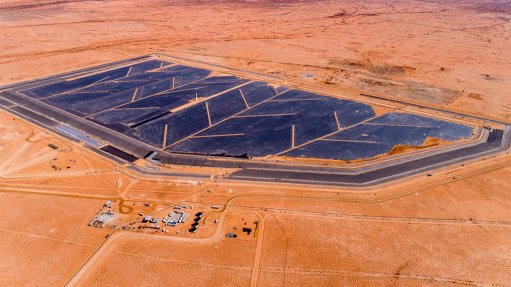
AWARD WINNING Knight Piésold won a South African Institution of Civil Engineering award for the design of the tailings storage facility of diversified miner Vedanta’s four-million-tonne-a-year Gamsberg zinc project
Multidisciplinary engineering and environmental consultancy Knight Piésold aims to expand its mining capability and market share, especially in tailings, as well as assist mines in developing renewable-energy projects in remote areas where grid power is unavailable or unreliable, says Knight Piésold mining technical director Andrew Copeland.
He tells Mining Weekly that, in South Africa, the company has a significant advantage over its peers, as it is a Level 1 broad-based black economic empowerment- (BBBEE-) certified, South African-owned company that has a significant global reach through its branch offices globally.
Last year, Knight Piésold won fourteen awards from industry associations Consulting Engineers South Africa (Cesa), the South African Institution of Civil Engineering (Saice) and the Institute of Municipal Engineers. This is the highest number of awards won by a firm last year.
The company won a Saice award for the design of the tailings storage facility (TSF) of diversified miner Vedanta’s four-million-tonne-a-year Gamsberg zinc project, in the Northern Cape. The company also won awards from Saice and Cesa for the design of State-owned phosphates company Foksor’s Selati TSF decant tower, in Phalaborwa, Limpopo.
“Knight Piésold has a reputation in the civil and mining industries for executing large and small projects on time, within budget and to high-quality standards,” Copeland highlights.
The company is working on several projects for major mining companies, including Anglo American, Rio Tinto, Glencore, Vedanta and AngloGold Ashanti, as well as for midtier and junior miners.
Knight Piésold also recently successfully completed a 14 MW run-of-river hydropower project in the Democratic Republic of Congo (DRC) for gold miner Randgold Resources’ Kibali gold mine.
He notes that the company has learned to tailor projects to suit clients and to make projects cost effective without compromising on quality and technical integrity.
Industry and Indaba
Copeland believes that mining in South Africa is in a challenging phase, owing to ageing gold, platinum, diamond and coal mines and many of the shallow, rich orebodies having been mined out.
He notes that the remaining orebodies are either deep and risky, requiring large capital investment or lower-grade and less feasible to mine.
“We will see many of the older, marginal mines closing. The investment climate is challenging for foreigners and a combination of labour, community and illegal miner issues, as well as taxes, political uncertainty and BBBEE requirements undermine confidence and profitability.” However, the revised Mining Charter III is considered a step in the right direction, he adds.
Moreover, there are opportunities and incentives to enter the market for local junior miners, he adds, but existing mines will focus on stay-in-business options, which will provide consulting work opportunities, such as ongoing monitoring of existing mineral residue facilities, with few expansion projects.
Although significant political risk exists for mines in other parts of Africa, there are significant opportunities in the DRC if things improve. He further notes that Namibia and Botswana are safer investment locations, while there are high-risk opportunities in Zambia, Mozambique, Angola, Tanzania and Zimbabwe. Knight Piésold has offices in Zambia, Namibia, the DRC and Madagascar, and can assist in the mitigation of some of these risks, Copeland mentions.
He advances that existing mines in many of the countries will “stagger along”, with few large expansion projects.
Meanwhile, Knight Piésold will attend the Investing in African Mining Indaba from February 4 to 7 at the Cape Town International Convention Centre. Copeland says the company attends the event to strengthen existing client relations, meet new clients, and assess market changes and opportunities.
“The Indaba provides a great networking opportunity, owing to the vast number of people all in one place.” The company will host a client event at the Mining Indaba.
He believes that the atmosphere at the event will be similar to that of last year, as there is still great interest and growth in the battery minerals market, and market conditions in many African countries have not changed dramatically.
However, investors will be wary of the election results in the DRC and Madagascar, and will also follow the local election build-up, he concludes.